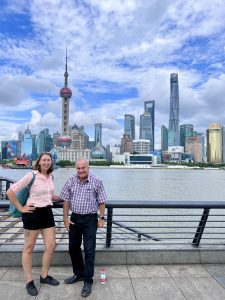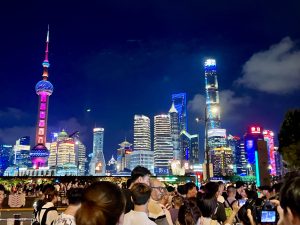Posted on September 25, 2023 by Robert V. Percival
Effective March 1, 2023, the Chinese government abruptly lifted travel restrictions imposed to combat the COVID pandemic. In August I visited China with one of my students, my first visit in more than four years. Five of the six students who initially planned to accompany me dropped out after the U.S. State Department on June 30 advised Americans against travel to China because of the risk of arbitrary detention. As China’s Communist Party increases its political grip, it has been nearly impossible for foreign NGOs to operate effectively in the country and Chinese elites now chafe at requirements that they pass regular tutorials in “XI Jinping Thought.”
My last trip to China was in 2019 when I spoke to China’s environmental judges at the National Judges’ College in Beijing. Prior to that trip, I had visited China nearly every year since 2005, sometimes multiple times per year. Much had changed in the four years since my last visit. The most astounding change was the nearly complete absence of foreigners. Tourist sites in Beijing, Shanghai, Suzhou and Hangzhou were crowded, but virtually all tourists were Chinese. Walking the length of Tiananmen Square and the Forbidden City we counted only 11 non-Chinese among the throngs of thousands.
When I first visited China in 1981 the country had just opened to foreigners. Wherever I went, crowds would gather around me because most Chinese had never seen foreigners. Now, 42 years later, it seemed eerily similar. Many Chinese asked to take our photos and pointed us out to their children who had not seen foreigners during the years of the COVID lockdown.
During my sabbatical in 2008 I lived in Beijing and taught for a semester at the China University of Political Science and Law. The Chinese economy then was booming with massive construction everywhere in preparation for the summer Olympics. Now there were few visible signs of large construction projects, consistent with what has been reported about China’s economic slowdown.
China’s rapid development led to a dangerous deterioration in environmental conditions, convincing the Communist Party to make environmental law an important priority. When China revised its basic environmental law in 2014, three ACOEL fellows – myself, David Petit, and Jim Holtkamp — testified before the Standing Committee of the Supreme People’s Congress on how China could make its environmental laws more enforceable. The new law codified public interest environmental litigation and substantially increased penalties for environmental violations.
The country’s strengthened environmental laws seem to be producing results. While tap water remains unsafe to drink, air quality in large cities has visibly improved and data show improving water quality in many parts of the country. A specialized environmental bar also seems to be developing, as we learned while visiting a large Shanghai law firm with an award-winning environmental practice group.
On August 15 China celebrated its first National Ecology Day, as decreed by Chinese President Xi Jinping. To mark this event I spoke at an environmental conference in Shanghai. Lawyers at the conference were particularly interested in hearing about how U.S. law handled liability for soil contamination and the use of third-party corporate compliance mechanisms.
Climate change adaptation and mitigation is now considered a top policy priority in China, a major change from the past. In 2009 the U.S. State Department sent me on a two-week lecture tour of China to highlight the importance of China agreeing to cap its greenhouse gas emissions. The Chinese government refused to make such a commitment at the December 2009 Copenhagen COP, but now it has pledged to peak its emissions by 2030 and to be carbon neutral by 2060. Several government plans and directives seek to advance these goals, but national climate legislation, which has been debated for years, still has not been finalized. A particular sore point with environmentalists is the Chinese government’s suspension of its pledge to stop building new coal-fired power plants. This was described as a temporary response to fears of energy price spikes in the wake of Russia’s invasion of Ukraine.
Relations between China and the U.S. have deteriorated in recent years. In July Biden climate envoy John Kerry flew to Beijing to visit his old friend Xie Zhenhua, China’s long-time climate negotiator. But Chinese President Xi Jinping responded to the Kerry visit by pointedly announcing that China will follow its own path on future carbon reduction. One can only hope that relations between the two countries will improve in the future so that it is not considered risky for Americans to visit China.



